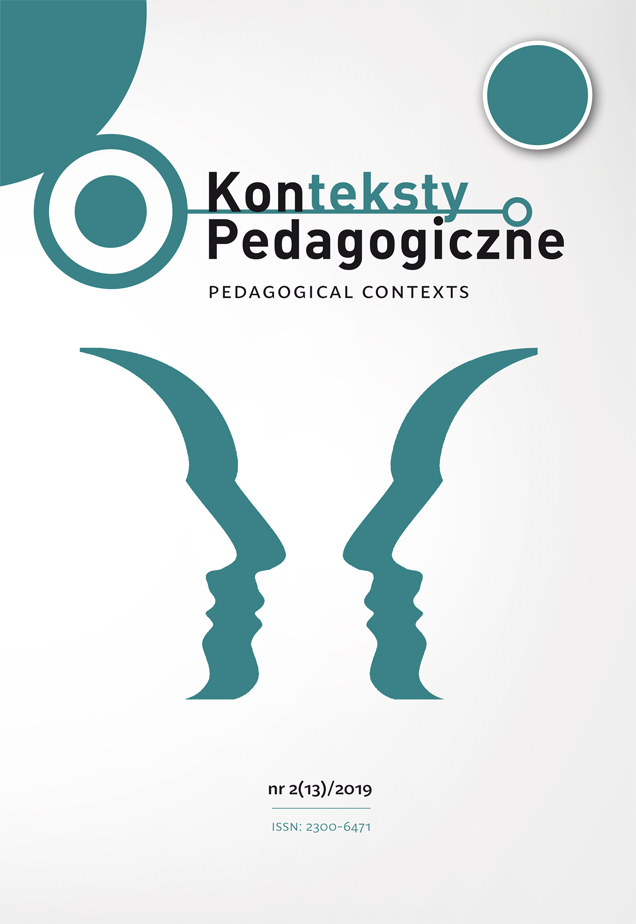Abstract
The mainstream category is a constitutive element of the traditionally understood inclusive education (the one based on the reconstruction of special needs education). Most authors of definitions formulated in the early stages of the development of inclusive education theory refer to this category. The presence of a student with (intellectual) disability in the mainstream of lesson work may be viewed in physical, social and cognitive terms. The indicators of the last one are, among others, the ability to provide answers to questions and follow instructions directed to all the students in the class. The aim of this study is to present results of research regarding this issue. While accumulating the data, the questionnaire technique was used, addressed to teachers of general access classes working with students with mild intellectual disability. The presented results are a part of a wider research project concerning the educational situation of this group of students in general access school. The study was conducted in three phases (in years: 2004, 2009, 2014) on the group of 450 teachers (150 teachers in each instalment).
References
Arends, R.I. (1994). Uczymy się nauczać [Learning to Teach], transl. K. Kruszewski. Warszawa: Wydawnictwa Szkolne i Pedagogiczne.
Bełza, M. (2015). Systemy edukacji osób umiarkowanie i znacznie oraz głęboko niepełnosprawnych intelektualnie (na przykładzie rozwiązań w Anglii, Republice Czeskiej i Polsce) [Education Systems for People with Moderate, Severe and Profound Intellectual Disabilities (based on the example of solutions adopted in England, Czech Republic and Poland)]. Katowice: Wydawnictwo Uniwersytetu Śląskiego.
Chrzanowska, I. (2006). Z badań nad efektami włączającego kształcenia uczniów niepełnosprawnych intelektualnie [From Research on the Effects of Inclusive Education of Students with Intellectual Disabilities]. In: C. Kosakowski, A. Krause and S. Przybyliński (eds.), Dyskursy pedagogiki specjalnej 5. Pomiędzy teorią a praktyką [Discussions on Special Needs Education 5. Between Theory and Practice] (pp. 323–330). Olsztyn: Wydawnictwo Uniwersytetu Warmińsko-Mazurskiego.
Cytowska, B. (2016). Przegląd badań empirycznych nad inkluzją w edukacji [An Overview of Empirical Research on Inclusion in Education]. Problemy Edukacji, Rehabilitacji i Socjalizacji Osób Niepełnosprawnych, 22, 189–213.
Depoy, E. and Gilson, S.F. (2011). Studying Disability. Multiple Theories and Responses. Sage: Los Angeles–London–New Delhi–Singapore–Washington, DC.
Friend, M. (2011). Special Education. Contemporary Perspectives for School Professionals. Boston: PEARSON.
Gajdzica, Z. (2018). Two Cultures of Inclusive Education of Learners with Disabilities as Two Borderland Cultures. Kultura i Edukacja, 4, 63–76.
Göransson, K. and Nilholm, C. (2014). Conceptual diversities and empirical shortcomings – a critical analysis of research on inclusive education. European Journal of Special Needs Education, 29(3), 265–280.
Klus-Stańska, D. (2018). Paradygmaty dydaktyki. Myśleć teorią o praktyce [Paradigms of Didactics. Thinking Theory about Practice]. Warszawa: Wydawnictwo Naukowe PWN.
Kojs, W. (1988). Zadania dydaktyczne w nauczaniu początkowym [Teaching Tasks in Early Childhood Education]. Katowice: Wydawnictwo Uniwersytetu Śląskiego.
Łukasiewicz, J. (1987). O zasadzie sprzeczności u Arystotelesa [On the Principle of Contradiction in Aristotle. A Critical Study]. Warszawa: Państwowe Wydawnictwo Naukowe.
Okoń, W. (1992). Słownik Pedagogiczny [Pedagogical Dictionary]. Warszawa: Wydawnictwo Naukowe PWN.
Poplucz, J. (1990). Polecenia w pracy nauczyciela [Instructions in Teacher’s Work]. Ruch Pedagogiczny, 5–6, 5–12.
Reynolds, C.R. and Fletcher-Janzen, E. (eds.) (2002). Concise Encyclopedia of Special Education. A Reference for the Education of the Handicapped and Other Exceptional Children and Adults. New York: John Willey and Sons.
Richardson, J.G. and Powell, J.J.W. (2011). Comparing Special Education. Origins to Contemporary Paradoxes. California: Stanford University Press.
Sośnicki, K. (1963). Poradnik dydaktyczny [Teaching Guidebook]. Warszawa: Państwowe Zakłady Wydawnictw Szkolnych.
Szumski, G. (2010). Wokół edukacji włączającej. Efekty kształcenia uczniów z niepełnosprawnością intelektualną w stopniu lekkim w klasach specjalnych, integracyjnych i ogólnodostępnych [Around Inclusive Education. Effects of Teaching Students with Mild Intellectual Disabilities in Special, Integration and Public Classes]. Warszawa: Wydawnictwo APS–Wydawnictwo Naukowe PWN.
Thomas, G. and Loxley, A. (2007). Deconstructing Special Education and Constructing Inclusion. New York: Open University Press.
Zamkowska, A. (2009). Wsparcie edukacyjne uczniów z upośledzeniem umysłowym w stopniu lekkim w różnych formach kształcenia na I etapie edukacji [Educational Support for Students with Mild Intellectual Disabilities in Various Forms of Teaching in the First Stage of Education]. Radom: Wydawnictwo Politechniki Radomskiej.
Ziembiński, Z. (1996). Logika praktyczna [Practical Logistics]. Warszawa: Wydawnictwo Naukowe PWN.
In accordance with the recommendation of the Ministry of Science and Higher Education, which aims to counteract the practice of “ghostwriting” and “guest authorship,” all authors submitting their text for publication should attach an author’s statement which declares the contribution of each of the authors to the article. The printed and signed statement should be delivered by mail or other means to editor-in-chief Joanna Skibska or sent in the form of a scan to the following e-mail address: redakcja@kontekstypedagogczne.pl. The authors will not receive remuneration for publishing their papers. The editors reserve the right to make minor editorial changes to the articles which will not affect the substance of the article. We encourage all authors to prepare their articles in accordance with the guidelines for manuscript preparation. Download pdf file.
Authors transfer all copyrights and grant the journal the right of first publication with the work simultaneously licensed under a Creative Commons Attribution License that allows others to share the work with acknowledgement of the work's authorship and initial publication in this journal. All authors agree to the publishing of their email addresses, affiliations and short bio statements with their articles during the submission process.

